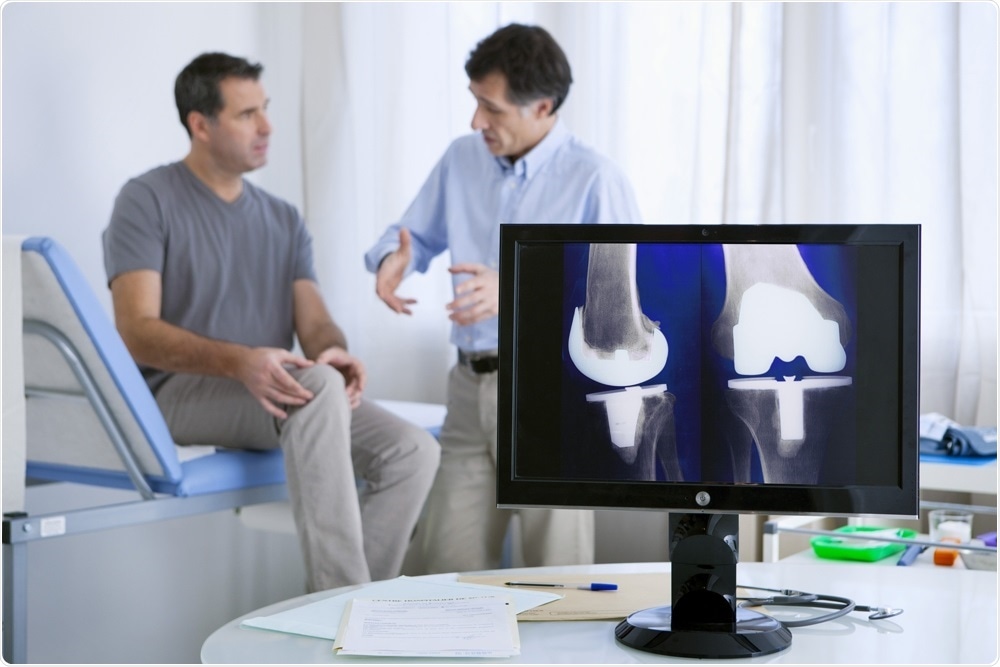The existing methods for the regeneration of injured cartilage generate tissue that breaks down. This deterioration eventually leads to osteoarthritis—the commonly seen form of arthritis—affecting over 32.5 million grown-ups in the United States, as per the Centers for Disease Control and Prevention.

Image Credit: University of Oklahoma
The problem with cartilage regeneration is that cartilage is not able to heal itself, so you end up with an inferior, fibrous kind of tissue—similar to scar tissue—that is susceptible to breaking down over time, leading to more serious interventions like a total knee replacement surgery.”
Michael Detamore PhD, Founding Director, Professor, and Stephenson Chair, Biomedical Engineering, Gallogly College of Engineering, University of Oklahoma
Detamore is the main investigator of a research project being carried out at OU and OU Health. The research utilizes a protein fragment pinpointed by comparing two various molecules that assist stem cell conversion to true cartilage cells.
Detamore further adds, “The patients that we aim to help are those who have had a recent impact injury to the cartilage in their knee, such as from a car accident or sports injury.”
For someone who has a focal, local cartilage injury, this treatment we’re investigating has the potential to repair that cartilage. The questions that we’re asking are, ‘How can we help the body heal itself?’ ‘How can we help the cells that are already present in the bone marrow underneath the cartilage to become actual cartilage cells?’”
Michael Detamore PhD, Founding Director, Professor, and Stephenson Chair, Biomedical Engineering, Gallogly College of Engineering, University of Oklahoma
The project was funded by a grant from the National Institutes of Health. It would analyze the repair of injured cartilage in a rabbit knee by introducing a material comprising of the novel protein fragment at the injured site.
The group includes Handan Acar PhD, an assistant professor in the Stephenson School of Biomedical Engineering, and orthopedic surgeon Amgad Haleem MD, PhD, at OU Health.
“Professor Acar is a worldwide expert in peptides (small fragments of proteins). Her research leverage peptides to fight cancer. For our project, she’s applying her expertise to help us leverage peptides to regenerate cartilage cells from bone marrow stem cells,” remarked Detamore.
“Dr. Haleem, as a clinician-scientist, brings to the project a deep understanding of the science behind cartilage repair, coupled with surgical ability and expertise,” adds Detamore.
Moreover, this approach of helping the body regenerate cartilage would mitigate the necessity for certain medications and alleviate adoption into the market.
“If a surgeon has access to this material that the cells respond to, as opposed to needing to add a drug or cells from another source—if the material itself could elicit the desired response from those cells—then we’re helping the body to heal itself and make new cartilage, rather than inferior scar tissue.”
Michael Detamore PhD, Founding Director, Professor, and Stephenson Chair, Biomedical Engineering, Gallogly College of Engineering, University of Oklahoma
“Added to this the translational benefits, such as lower costs of raw materials, also mean lower costs to the patients, hospitals, and insurance companies, and a more straightforward pathway through the FDA. These translational and business advantages of how we get this to a patient, go side-by-side with the scientific advantages of helping us better understand how the cells respond,” Detamore stated.
The concept for this project was attained from the dissertation work of a doctoral student in Detamore’s Translational Regenerative Medicine Laboratory. Salma Mahzoon PhD is currently a scientist for a pharmaceutical company situated in Maryland. Her related study was published in the Annals of Biomedical Engineering journal in 2019.
Detamore states, “Her foundational research created a platform that enabled this project to be possible.”